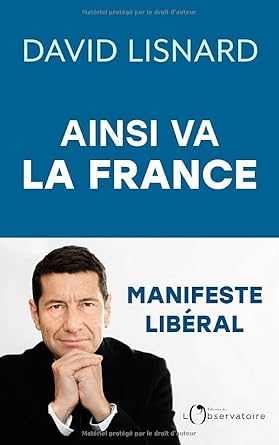The author signs with Ainsi va la France: Manifeste libéral an incisive diagnosis of the ills that paralyze France. Carried by a lively pen, with sometimes pamphleteering accents, tempered by the clinical and concrete analysis of a local practitioner, he traces a clear path to avert this decline.
Beginning his demonstration by focusing on “seeing what we see”, as Péguy wrote, the author draws a twilight observation. France, once a beacon of the Enlightenment, is withering under a centralized, hypertrophied state, captive to an out-of-control debt. Its republican universalism is buckling under the blows of a separatist communitarianism, fueled by mass immigration. The nation fails to guarantee the absolute rights of the social pact: public order, the sister of freedom, is undermined by a criminal policy deemed complacent; public education is lost in wokism, to the detriment of basic learning; entrepreneurship is asphyxiated by hypernormativity and crushing production taxes; the competitiveness of agriculture and industries is hampered by punitive technocratic environmentalism, erratic energy policy and Kafkaesque administration.
Having made this observation, the author sets out to draw up a recovery plan for the country. He calls for the modernization of the state through bold decentralization, based on subsidiarity, where mayors, artisans of reality, become levers of innovation. An implacable fight against delinquency and Islamism with a return to assimilationism is advocated. He calls for the revitalization of culture and education to reconnect with universal values, an antidote to identity tensions.
He pleads for a civic leap, which requires reforms to save the social pact weakened by a health system in crisis, a declining demography and a school collapse: partial capitalization of pensions, overhaul of unemployment insurance, natalist policy, and a school refocused on fundamental knowledge, in opposition to wokism and racialism, scourges of a “decivilization” that the author fights with obstinacy. He encourages an ecological market economy, with nuclear power, an essentially carbon-free energy, as a strategic pivot, and sustainable and competitive agriculture, freed from absurd regulatory rigidities. He advocates an industrial reconquest in the automotive, space and AI sectors, made possible by a reduction in public spending and a massive reduction in production taxes.
His manifesto continues with a partisan analysis of the 2024 European elections, marked by the rise of the National Rally and the resilience of the Republican right led by François-Xavier Bellamy, which led the President of the Republic to dissolve the National Assembly.
However, in a France often resistant to change, if his observation is shared by the majority of commentators and public opinion, his vision, radical in the etymological sense, could come up against the administrative technostructure and intermediary bodies, with unions at the forefront. We are then entitled to question the improbable adherence to this ambitious project by a high administration whose ethics of conviction risks crumbling in the face of the demands of the ethics of responsibility dear to Max Weber.
David Lisnard, born in 1969 in Limoges and a graduate of Sciences Po Bordeaux, is a French politician and member of the Republicans. Founder of the Nouvelle Énergie movement and mayor of Cannes since 2014, he has been president of the Association of Mayors of France since 2021.


